About

Founded nearly 30 years ago, the Center honors the South’s long histories of exchange, creativity, conflict, and transformation and explores the history and cultures of its diverse peoples through rigorous scholarship, dialogue, collaboration, and the arts. Its work in publication, research, and teaching is informed by an ethical commitment to the highest standards of equity and critical inquiry.
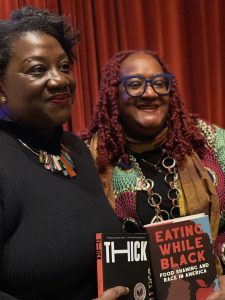
Critical Conversations
CSAS uses research to serve, inform, and engage UNC stakeholders with diverse experiences of the South and compelling visions for its future. Through publishing, collecting, teaching, and mentoring, the Center advances its core value of scholarship in service by facilitating meaningful relationships among its students, faculty, campus partners, and communities.
These critical conversations take shape through our Southern Oral History Program, a nationally recognized leader in oral history research, collection, and teaching; and Southern Cultures, the Center’s award-winning quarterly journal, which combines creative work with the rigors of peer-review for both general and scholarly audiences.
CSAS also serves as a hub for the Critical Ethnic Studies Collective and the campus-wide Southern Futures initiative. Hosting dialogues and nurturing inquiry that promote honest reckoning with the South’s painful legacies and raise the voices of all of its peoples is the cornerstone of the Center’s work.
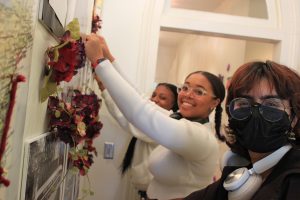
Creative Expression
At CSAS, artistic imagination is necessary to envision a future we want to be in together. Through our Art @ the Center exhibits, Southern Cultures’s Poetry on the Porch series, SOHP’s “Sonic South” audio competition, and initiatives like the Imagining UNC’s Future with Art grant, CSAS further elevates storytelling as a vehicle for connection and transformation.
“Any kind of artistic project is trying to tell some kind of truth. That’s also what activism is; it’s knowing a truth and trying to act in accord with that truth.” —Cortland Gilliam, Black Out Loud Artist-Curator and Imagining UNC’s Future with Art grant recipient
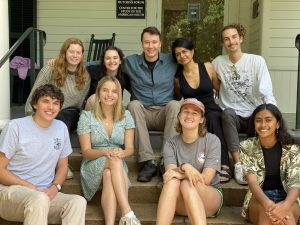
Rigorous Scholarship
As part of the 11th-largest research university in the United States, CSAS serves as a hub for interdisciplinary research and teaching to produce critical scholarship through many lenses. Our interdisciplinary journal Southern Cultures has a global reach and interdisciplinary projects like the Southern Oral History Program’s Stories to Save Lives foster collaboration with UNC’s exceptional libraries, institutes, and community partners. We also award numerous grants for interdisciplinary work related to the South, including the McColl Dissertation Fellowship.
“There is a conversation about racism and white supremacy that takes place in various academic disciplines; and there’s a conversation about the South that takes place in various academic disciplines. There needs to be a strong link between these conversations in higher education, and what’s happening for and with students in public school classrooms.” —Christoph Stutts, former social studies teacher, and the 2019–2020 McColl Dissertation Fellow
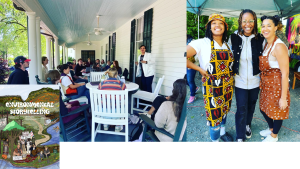
Imagining a Future
Critical conversations, creative expression, and rigorous scholarship all contribute to building a future together in the changing South. The Critical Ethnic Studies Collective, convened in the Fall of 2019, funded a working writing group for PhD students working on their dissertations. The Southern Futures initiative brings together UNC’s resources to build a future where all Southern communities can flourish.
History
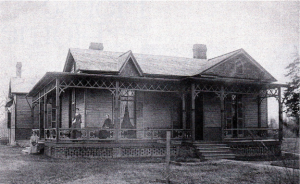
The Center for the Study of the American South was founded in 1992 by UNC to support scholarship on different aspects of the region the historical, cultural, economic, social, and political – and their intersections.
CSAS is located in the historic Love House, designed and built in 1887 on the corner Franklin and Battle, the Northeast corner of UNC’s campus. Read more>>
The history of the Love House has also been explored by artist Lauren Frances Adams in her project “In Faithful Remembrance,” as well as students of History/American Studies 671:Introduction to Public History as part of a project called “Names in Brick and Stone: Histories from the University’s Built Landscape.”
Contact Us
Center for the Study of the American South
410 East Franklin Street
Campus Box # 9127
UNC-Chapel Hill
Chapel Hill, NC 27599-9127
(919) 962-5665 (ph)
(919) 962-4433 (fax)
Staff Directory
CSAS Director Blair L.M. Kelley
CSAS Administrative Manager Terri Lorant
CSAS Administrative Assistant to the Director Melissa Peng
CSAS Senior Leadership Advisor Marcie Cohen Ferris
CSAS 2023-2024 Research Assistant Melody Hunter-Pillion
Executive Editor Ayşe Erginer
Deputy Editor & Art Director Emily Wallace
Managing Editor Annie Lubinsky
Associate Editor Irene Newman
Director Seth Kotch
Interim Director Renee Alexander Craft
Associate Director Phillip MacDonald
Assistant Director Jordan Lovejoy
Directions, Parking, and Accessibility
The Center for the Study of the American South is located at 410 East Franklin Street, on the corner of Franklin Street and Battle Lane, in Chapel Hill, NC. We are located on the (free) CL, D, and F bus routes of Chapel Hill Transit.
Our on-site parking is very limited. The nearest public parking is on the street or at the parking deck on Rosemary Street. For weeknight and weekend parking, check UNC’s parking guide.
The Love House is accessible by a ramp located at our parking lot entrance off of Battle Lane.
